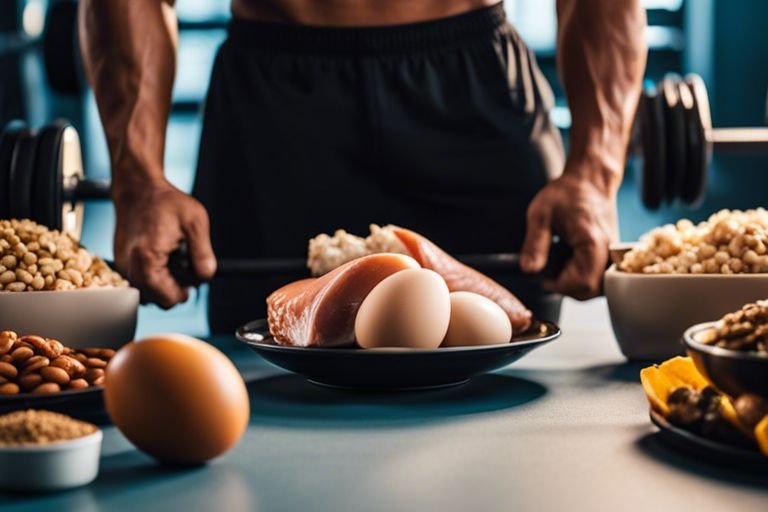Protein, the building block for muscle repair and growth, plays a crucial role in enhancing athletic performance and overall health. In this informative blog post, we explore into the various benefits of protein-rich foods, exploring how they can help optimize muscle growth and recovery. Understanding the power of protein in your diet can be a game-changer in achieving your fitness goals and maintaining a strong and healthy body. Let’s unlock the secrets of protein-rich foods and their impact on muscle development.
Key Takeaways:
- Protein is vital for muscle growth: Consuming protein-rich foods is crucial for muscle repair and growth after exercise.
- Vary protein sources: Incorporating a variety of protein sources such as meat, poultry, fish, dairy, legumes, and nuts can provide a balanced intake of vital amino acids for muscle development.
- Timing matters: Consuming protein-rich foods within 30 minutes to an hour after a workout can optimize muscle protein synthesis, leading to better muscle growth and recovery.
The Science of Muscle Growth
How Protein-Rich Foods Support Muscle Development
With exercise and physical activity, your muscles undergo stress and damage, prompting the body to repair and rebuild them stronger and more resilient. This process is known as muscle hypertrophy, where muscle fibers increase in size. Protein-rich foods play a crucial role in supporting this muscle development by providing the necessary building blocks for repair and growth.
The Role of Amino Acids in Muscle Building
Muscle growth is heavily reliant on amino acids, the basic units that make up proteins. Essential amino acids, which cannot be produced by the body and must be obtained through diet, are particularly important for muscle building. These amino acids serve as the fuel for muscle repair and growth, supporting processes like protein synthesis and reducing muscle breakdown.
Amino acids such as leucine have been identified as key players in stimulating muscle protein synthesis, the process by which new muscle tissue is created. By including protein-rich foods that are high in imperative amino acids in your diet, you can effectively support your muscle-building goals and optimize the benefits of your workouts.

Top Protein-Rich Foods for Muscle Growth
You know that getting enough protein is vital for muscle growth and repair. Here are some top protein-rich foods that can help you reach your fitness goals:
Lean Meats: Chicken, Turkey, and Fish
To fuel your muscles with high-quality protein, lean meats like chicken, turkey, and fish are excellent choices. These protein sources are not only low in fat but also rich in vital amino acids that support muscle building and recovery.
Eggs: A Convenient and High-Quality Protein Source
Fish eggs are a convenient and high-quality protein source that can easily be incorporated into your diet. They contain all the vital amino acids your body needs for muscle growth and repair. Additionally, eggs are versatile and can be enjoyed in various ways, making them a popular choice among fitness enthusiasts.
Growth: With their high protein content and amino acid profile, eggs are a powerhouse of nutrition for muscle growth and recovery. Including eggs in your diet can help you meet your protein needs and support your fitness goals effectively.
Legumes: Beans, Lentils, and Peas
Peas are not only a good source of plant-based protein but also pack a variety of vitamins, minerals, and fiber. Including legumes like beans, lentils, and peas in your meals can provide a sustainable source of protein for muscle growth and overall health.
Understanding: Legumes are an excellent protein option for vegetarians and vegans looking to support muscle growth. They are also rich in antioxidants and phytonutrients that offer additional health benefits beyond muscle building.
Nuts and Seeds: Almonds, Chia Seeds, and Hemp Seeds
For a plant-based protein boost, nuts and seeds like almonds, chia seeds, and hemp seeds are great choices. These nutrient-dense foods not only provide protein but also vital fatty acids and micronutrients that support muscle recovery and overall well-being.
Source: Nuts and seeds are versatile additions to your diet that can enhance the protein content of your meals. Including a variety of nuts and seeds in your diet can help you meet your protein needs while enjoying a range of flavors and textures.
The Importance of Timing and Portion Control
All too often, individuals focus solely on the quantity of protein intake rather than the timing and portion control aspects. Understanding when and how much protein to consume can significantly impact muscle growth and overall health. In a comprehensive guide like Unlocking the Secrets of Protein: Your Path to Optimal Health, the role of timing and portion control in maximizing the benefits of protein-rich foods is emphasized.
Pre-Workout Snacks for Optimal Muscle Fueling
Portion control and timing are crucial when it comes to pre-workout snacks for optimal muscle fueling. Consuming a balanced snack containing carbohydrates and protein about 30-60 minutes before exercise can provide the necessary energy and nutrients for a productive workout. Examples of suitable pre-workout snacks include a banana with nut butter, Greek yogurt with berries, or a small protein smoothie.
Post-Workout Nutrition for Muscle Recovery
PreWorkout
After a workout, the body requires proper nutrition to kickstart the muscle recovery process. Consuming a combination of protein and carbohydrates within 30-60 minutes post-exercise can help replenish glycogen stores and promote muscle repair. A protein shake with a banana, whole grain toast with turkey, or chocolate milk are excellent choices for post-workout nutrition.
Meal Frequency and Timing for Muscle Growth
Snacks
Regarding meal frequency and timing for muscle growth, spreading protein intake throughout the day can be beneficial. Consuming protein-rich snacks like nuts, Greek yogurt, or boiled eggs between meals can help maintain a steady supply of amino acids for muscle repair and growth. Additionally, having a protein-rich meal within 2 hours of a workout can further enhance muscle recovery and adaptation.
Control
Understanding the importance of timing and portion control when it comes to protein intake is imperative for maximizing muscle growth and overall health. By strategically incorporating protein-rich foods into your diet at the right times and in appropriate amounts, you can unlock the full potential of these valuable nutrients for optimal muscle fueling, recovery, and growth.

Debunking Common Myths About Protein-Rich Foods
The Myth of Excessive Protein Intake
Not all protein intake is beneficial for muscle growth, and there is a common myth that more protein equates to more muscle. An excessive intake of protein can actually be detrimental to your health, as it puts a strain on the kidneys and can lead to dehydration. It’s crucial to consume the right amount of protein based on your individual needs and activity level.
The Importance of Balanced Macronutrient Intake
ProteinRich foods are often touted as the key to muscle growth, but it’s crucial to remember that a balanced intake of carbohydrates, proteins, and fats is necessary for overall health and fitness. While protein is important for muscle repair and growth, carbohydrates provide energy for workouts, and fats are crucial for hormone production and nutrient absorption. A well-rounded diet that includes a variety of nutrients is key to maximizing the benefits of protein-rich foods.
ProteinRich foods are a valuable component of a balanced diet, but they should not be the sole focus. By incorporating a variety of nutrient-dense foods into your meals, you can ensure that you are meeting all of your body’s needs and supporting optimal muscle growth and overall health.
Protein-Rich Foods and Kidney Health
Common misconceptions suggest that a high intake of protein-rich foods can have negative effects on kidney health. However, for individuals with healthy kidneys, moderate protein consumption is unlikely to cause harm. It’s important to stay hydrated and maintain a well-rounded diet to support kidney function while enjoying the benefits of protein-rich foods for muscle growth.
Maximizing Muscle Growth with Protein-Rich Foods
Many fitness enthusiasts understand the importance of incorporating protein-rich foods into their diet to support muscle growth. However, to truly maximize muscle development, it is important to consider how these foods can be strategically combined with other aspects of an effective training regimen.
Combining Protein-Rich Foods with Resistance Training
Resistance training, such as weightlifting, is crucial for stimulating muscle growth. When paired with a diet rich in protein, the effects of resistance training can be optimized. Consuming protein-rich foods before and after a workout can help enhance muscle protein synthesis, leading to greater muscle repair and growth.
Progressive Overload and Muscle Growth
One key principle in muscle building is progressive overload. This concept involves gradually increasing the intensity or volume of your workouts to continually challenge your muscles. By consistently pushing your limits and increasing the demands placed on your muscles, you create the ideal conditions for muscle growth.
One effective way to implement progressive overload is by progressively increasing the amount of weight lifted during resistance training sessions. This gradual increase in resistance forces the muscles to adapt and grow stronger over time, leading to noticeable improvements in muscle size and strength.
Rest and Recovery: The Often-Overlooked Aspect of Muscle Growth
Muscle growth doesn’t just happen during workouts; it occurs during the rest and recovery periods as well. Adequate rest is crucial for allowing the muscles to repair and rebuild after intense training sessions. Failing to prioritize rest and recovery can hinder muscle growth and increase the risk of overtraining.
Rest days are just as important as training days when it comes to building muscle. During rest periods, the body can replenish energy stores, repair muscle tissue, and adapt to the stress placed on it during training. By ensuring you get enough rest between workouts, you can optimize muscle growth and prevent the risk of burnout.
Overload
All things considered, incorporating protein-rich foods into your diet, combining them with effective resistance training, implementing progressive overload, and prioritizing rest and recovery are all key components of maximizing muscle growth. By understanding how these elements work together, you can create an optimal environment for muscle development and achieve your fitness goals more effectively.
Special Considerations for Vegetarians and Vegans
Plant-Based Protein Sources for Muscle Growth
To support muscle growth on a plant-based diet, individuals can turn to a variety of protein-rich plant sources such as lentils, chickpeas, quinoa, tofu, tempeh, edamame, nuts, seeds, and ancient grains like amaranth. These options not only provide necessary amino acids but also offer other nutrients crucial for overall health.
Meal Planning and Supplementation for Vegetarian and Vegan Athletes
Vegans and vegetarians need to be mindful of their meal planning to ensure they are getting a balanced intake of protein and other nutrients necessary for muscle growth and recovery. While whole plant-based foods should form the foundation of their diet, incorporating protein supplements like pea protein or soy protein powders can be beneficial, especially around training sessions to support muscle repair.
It’s necessary for vegetarian and vegan athletes to pay attention to their overall caloric and protein intake to support their muscle growth goals. Planning meals that include a variety of plant-based protein sources and supplementing when needed can help them meet their nutritional requirements for optimal performance.
Final Words
The benefits of protein-rich foods for muscle growth are crucial for anyone looking to enhance their strength and physical performance. By understanding the importance of incorporating proteins into our diets, we can make informed decisions about the foods we consume to support our fitness goals. From lean meats to plant-based sources like legumes and nuts, there are a variety of options available to help us unlock the benefits of protein for optimal muscle growth.
The key is to be mindful of our protein intake and ensure we are consuming enough to support our muscle development. With the right combination of protein-rich foods and a well-rounded fitness routine, we can maximize our muscle growth potential and achieve our desired physical outcomes. Embracing the power of protein is not only beneficial for our muscles but also for our overall health and well-being.
FAQ
Q: What are protein-rich foods and why are they important for muscle growth?
A: Protein-rich foods are foods that contain high levels of protein, such as lean meats, fish, eggs, dairy products, legumes, and nuts. These foods are important for muscle growth because protein is imperative for building and repairing muscle tissue. When you consume protein-rich foods, your body breaks down the protein into amino acids, which are the building blocks of muscle. These amino acids are then used by your body to repair and grow muscle tissue, making protein-rich foods crucial for muscle development.
Q: How much protein should I consume for optimal muscle growth?
A: The amount of protein you should consume for optimal muscle growth can vary depending on factors such as your age, weight, activity level, and fitness goals. As a general guideline, it is recommended that active individuals aiming to build muscle consume between 1.2 to 2.2 grams of protein per kilogram of body weight per day. It is important to spread your protein intake throughout the day and include a variety of protein sources to ensure you are getting all the imperative amino acids needed for muscle growth.
Q: Are there any potential risks of consuming too much protein for muscle growth?
A: While protein is imperative for muscle growth, consuming excessive amounts of protein can have potential risks. High protein intake can put a strain on the kidneys, especially for individuals with pre-existing kidney conditions. Additionally, consuming very high levels of protein may lead to an imbalance in other important nutrients in your diet. It is important to consult with a healthcare provider or a nutritionist to determine the appropriate amount of protein for your individual needs and to ensure you are consuming a balanced diet for overall health and muscle growth.
